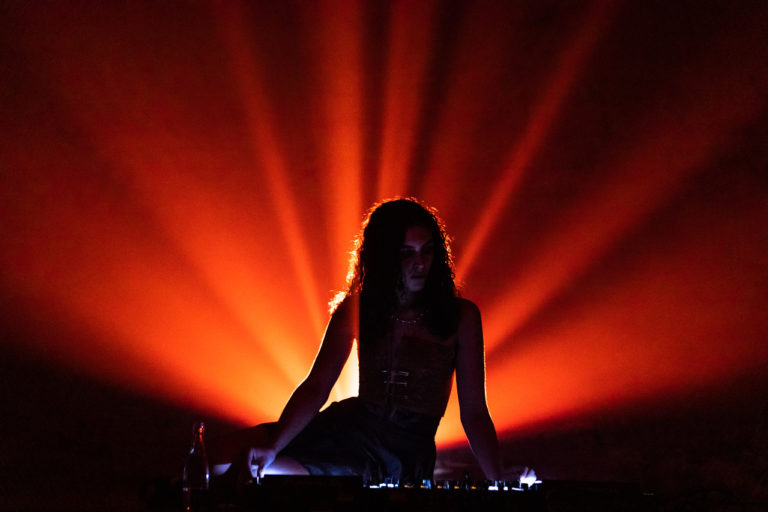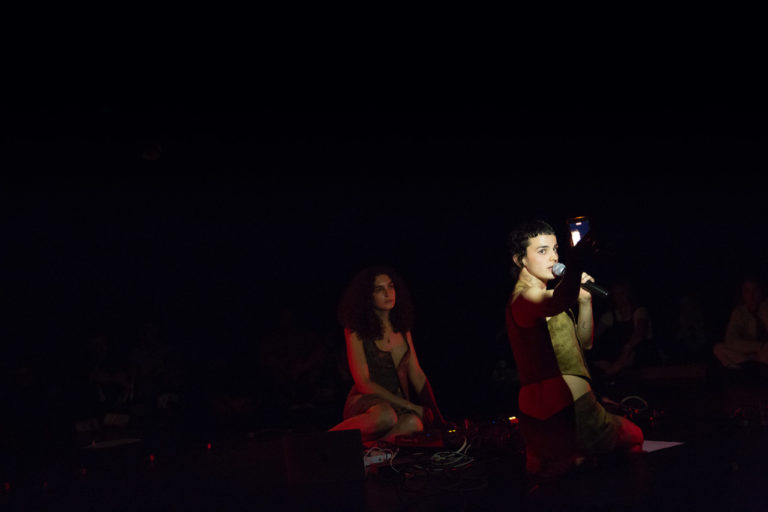Author: Cécile Moroux
On International Women's Day, data highlighted progress and disparities in the music industry. For instance in the UK, only 13% of festival headliners were female in 2022[1], just 4% of top electronic tracks are produced by women,[2] and black women music creators earn 25% less than their white counterparts.[3] These inequalities observed among artists are notably due to the underrepresentation of FLINTA individuals in top executive positions. Addressing these inequalities requires challenging aesthetic hierarchies and reforming intermediaries such as booking and management agencies. So, what is going on backstage? What are the new practices emerging? What role do independent organisations play in this evolution?

Bérénice (Cuarto de Pastilla), Invocaciones at MACBA, Barcelona, on June 22nd, 2023 – © Dani Canto
To explore this topic, Eloisa Blitzer and Luli Acosta Quintas, co-founders of the independent booking agency Sentimental in Barcelona, Spain, were interviewed. They are known for their LGBTQIA+ inclusive events and artist roster. Their vision challenges the monopolistic mindset in tour management, emphasising community involvement over owning big names or venues. Acting as bookers, managers and promoters, they prioritise giving back to their community while advocating for a diverse representation in the music industry.
Cécile Moroux: Can you introduce yourself?
Eloisa Blitzer: Luli and I, from Argentina and Uruguay respectively, now reside in Spain. We met on Tinder in 2020 during the pandemic, sparking a beautiful love story that has deeply influenced our lives. Together, we founded Sentimental, a booking agency, merging our backgrounds in the music industry. While I have roots in electronic music and clubbing, Luli's experience lies in underground punk/garage circuits. Despite our different musical paths, our connection opened doors to new worlds for both of us.
I've been deeply immersed in electronic music since my youth in Uruguay. In Spain, I worked with Resident Advisor, a record label, and managed artist bookings. In 2018, I co-founded MARICAS, a pioneering queer collective focused on FLINTA* artists and spaces. MARICAS quickly became a significant reference in dance music, known for its parties, record label, and inclusive values. This project empowered me to embark on new ventures due to its success. In the meantime, Luli was involved with an independent record label and now she works in Sangre, a prominent management agency in Spain.
In what context was Sentimental created? What led you down this road?
Luli Acosta Quintas: Since we met, we've dreamed of a project where we choose the artists without higher-ups making decisions. In 2021, we met JOVENDELAPERLA and Berenice from the CULPA collective, which celebrates and vindicates trans existences. Their performance, "El Hechizo del viejecito" (now called "Cuarto de Pastilla"), a blend of poetry and experimental music, deeply moved us. It was a pivotal moment, confirming our desire to work with inspiring artists, regardless of their level of fame. Even if we weren't fully aware of it at the time, this moment sparked the beginning of our journey, driven by passion for the projects we love. It wasn't until May 2022 that we formalised our collaboration and started crafting our creative identity with GGT, who encapsulated our values perfectly. Over a year ago, in February 2023, we made it official on social media.

Jovendelperla - (cuarto de pastilla), Invocaciones at MACBA, Barcelona, on June 22nd, 2023 – © Dani Canto
What's the origin and meaning of the name and motto 'Deconstructed booking agency for vulnerable minds'?
Luli Acosta Quintas: When choosing our name, finding a word spelled the same in English and Spanish was crucial, signifying our sense of belonging while appealing to a wider audience. "Sentimental," which is pronounced the same in both languages, emerged, and we discovered that it also held significance in many other languages, thereby adding even more weight to the word.
The phrase "Deconstructed booking agency for vulnerable minds" emerged during a brainstorming session defining our agency's essence. Inspired by JOVENDELAPERLA and Berenice's performances, which tackle deep and vulnerable themes, our mission is to support projects that move audiences and use vulnerability as a powerful tool. We chose "Deconstructed" to distance ourselves from profit-driven norms in the music industry and honour queer identities we resonate with. Our aim is to support projects without sacrificing personal integrity to industry pressures, while still advocating for fair compensation.
Does your motto suggest that mental health is central to your booking agency's practice? If so, is it?
Luli Acosta Quintas: While not explicitly stated, it's deeply ingrained in us. Despite turbulent times, we hold onto a belief in humanity and mutual care. We aim to reflect these values to receive them in return. Sentimental isn't just an agency for booking shows; it's a support network, a sanctuary for celebrating failures and victories. It's a continual journey of learning and growth for us. That's what our manifesto states.
Eloisa Blitzer: I believe this is reflected in the close relationships we build with our artists, striving for genuine connections. When considering representation, it's vital that artists align with our core values, ensuring they feel valued and respected within our agency. We're mindful of avoiding tokenisation or exploitation, steering clear of trends like queerbaiting and pinkwashing. As queer individuals ourselves, with a background in numerous queer projects, this ethos is integral to our approach. Our artists' well-being and support are our top priorities.
How would you describe your experience within the music industry so far?
Eloisa Blitzer: Both of us have extensive experience in the music industry and have noticed its heavy dominance by white cis men. However, it's encouraging to witness new avenues emerging, with efforts to uplift minorities in agencies, promoters, parties, and labels. Yet, minorities still lack representation in positions of power, with white cis males predominantly in control. Despite this imbalance, many diverse sounds and genres within electronic music originate from minority groups who often don't profit from them. That's why we believe it's crucial to infiltrate mainstream spaces, as long as it's economically viable. With Sentimental, we aim to contribute to shifting this power balance, even in small ways.
Sentimental, though small, is growing organically and we're proud of its progress. While we're involved in other projects too, we avoid setting unrealistic expectations. We understand that recognition in the industry takes time and effort. Our involvement in various endeavours is a continuous learning experience, which we see as positive beyond the work itself.

Cuarto de Pastilla - Injuve, Teatro Padrillo Madrid, on October 9th, 2022 – © Julia Nicolau
Is your independent status important to you? Is it something you assert?
Luli Acosta Quintas: Independence is fundamental to our agency, giving us the freedom to choose collaborations. Sentimental will always be an independent booking agency, as our DNA and values are inherently tied to independence. Despite its drawbacks in economic status, contacts, and reach, our agency concept revolves around this independence, enabling a horizontal structure with artists and beyond. We value collaboration and enjoy working with other agencies, groups, and colleagues in the industry. We prioritise sharing information, building networks, and supporting one another. We don't subscribe to a competitive mindset; rather, we thrive in environments that embrace and nurture these values.
What are your hopes for the evolution of the music industry in the coming years?
Eloisa Blitzer: As an agency, we aim to expand our artists' reach and connect with broader audiences. Moreover, we're committed to providing our artists with a sanctuary—a safe space where they can feel comfortable and not pressured into anything.
We also hope to see greater representation of women, non-binary individuals, transgender individuals, and people of colour in positions of power within the music industry. Whether it's booking festivals, managing clubs, owning venues, or establishing booking and management agencies, we envision a more equitable distribution of power at the upper echelons of the industry. Additionally, we advocate for fair compensation for artists, particularly through streaming platforms like Spotify, where the current model poses significant challenges. Implementing higher fees for trans artists compared to male artists would also be great too!
[1] Women Make Music Report 2011- 2022, PRS Foundation, 2022, p:8
[2] Ibid.
[3] Ibid.
—
Other European independent and inclusive agencies you can check (non-exhaustive list): Futura Artists (Spain and Germany), OUTER agency (Germany), DIVA (France), Granko Agency (Poland), Les Filles Soniques (France), etc.
Links to go further:
Booker dans l’industrie musicale, une profession de défis, Libération, March 2024
Carving new paths: Ifeoluwa, Flore, ophélie & Vanille, Refuge Worldwide, March 2024
The music puzzle: exploring booking practices in Europe, Live DMA, 2024
Inclusion in the Recording Studio? Gender & Race/Ethnicity of Artists, Songwriters & Producers, USC Annenberg, January 2024
S1E2: Le milieu de la musique est-il sexiste ?, Sisters of Sound Podcast, January 2024
Women Make Music Report 2011-2022, PRS Foundation, March 2023
Live Entertainment, a Cash Machine, Reset! Network, 2023
Reducing gendered inequalities in music - Should booking practices be rethought?, CNMlab, March 2023
État des lieux de la présence des femmes dans la filière musicale, CNM, February 2023
Race- and gender-based under-representation of creative contributors: art, fashion, film, and music. Humanit Soc Sci Commun, 9, 221, June 2022
Published on June 4th, 2024
About the author:
Cécile Moroux has been working in the contemporary and electronic music sector since 2015. More recently, she has delved into the issues of work psychology and mental health. Notably, she has coordinated the We Are Europe European project and digital media within a network of 8 festivals in Europe, led by Arty Farty (Nuits sonores).